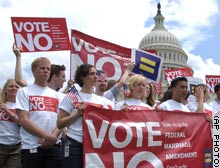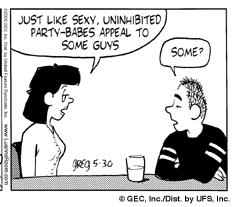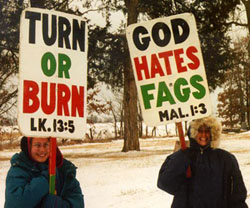So, as y’all should know by now, I currently live in Japan, but I consider my home area to be the Washington and British Columbia areas. My mom lives there and she recently e-mailed me a news article about the formation of GLBT Month in Jefferson County. The reason she did this was because of one letter to the editor that angered her very much.
In a nutshell, Connie Rosenquist, the letter writer, is angry over Jefferson County’s decision to have a GLBT Month. My mother said that most of the responses to the original article were positive, but this negative one pushed her buttons for a reason she couldn’t name. I read it and knew immediately what it was; it was the same attitude that opponents of this proclamation in the original article expressed. An attitude that oppression activists are intimately familiar with.
I’m talking about privilege.
In this case, the ability to believe that one’s privileged state is the “default” and therefore see any attempt at equality as the non-privileged groups to get “special” rights, or to see them as trying to shut you out of “your” community. I’ve taken this on from the perspective of helping potential allies, but now I want to examine exactly why these attitudes are actually harmful to the expressed goals of equality, neutrality, and inclusion.
I. The Myth of Cultural Neutrality
“While I do agree we don’t want discrimination, I don’t believe it exists in the county,†he said, pausing as a handful of people present who opposed the proclamation applauded.
“I don’t believe government should be taking a position on any lifestyle,†Rodgers said.
[From Gay pride proclamation stirs controversy by By Kasia Pierzga]
The position that conservatives like Rodgers and Rosenquist are coming from is founded on the notion that society, as it is right now, is neutral. For those of us who fight oppression, this assumption is obviously fallacious — if one could major in fighting oppression, the idea that we live in a neutral society would be debunked in Privilege 101. But, for the majority of people, this idea remains unquestioned until they find that rights that matter to them come into question. And even then, the connection might not be made unless they happen upon an article, discussion, or class and the idea is not only brought up but done so in a way that resonates with them.
In other words, I’m surprised that any of us actually interact with notions of privilege and what it means in our respective societies given what we have stacked against us. I mean, who wants to think about how our society is crappy and that all of us, in our own special ways, contribute to the crappiness? I sure don’t! But I know if I don’t, not only will I suffer, but everyone else will, too. And, well, what’s worse than thinking about a crappy society is realizing that I’m willfully participating in hurting other people.
 Bringing this back to privilege and the myth of a neutral culture. One of the main ideas behind the concept of privilege is that our privileged state is seen as a “default” or “neutral” state in society. In regards to feminism, the main principle is that of “male normativity” — or seeing men, and the masculine sphere, as the default human state. For racial activism, the main state is “assumption: white” — meaning that white people are seen as the default human state, and white culture is seen as the default culture. In this case, the privileged state being battled is that of heteronormativity.
Bringing this back to privilege and the myth of a neutral culture. One of the main ideas behind the concept of privilege is that our privileged state is seen as a “default” or “neutral” state in society. In regards to feminism, the main principle is that of “male normativity” — or seeing men, and the masculine sphere, as the default human state. For racial activism, the main state is “assumption: white” — meaning that white people are seen as the default human state, and white culture is seen as the default culture. In this case, the privileged state being battled is that of heteronormativity.
When Rodgers says that he doesn’t believe that the government should be taking a position on any lifestyle, he is clearly not counting heterosexuality as a “lifestyle.” For him, and those who hold the same beliefs, heterosexuality isn’t a lifestyle, it is simply a given in life. They are heterosexual, therefore everyone must be. The people who live outside of a traditional heterosexual lifestyle can’t be doing it it because it’s their default human state, but because they choose to live a different way.
But, I mean, the government is not staying out of people’s relationships. From the foundation of the United States of America, to the laws and regulations of America’s parent countries, and even looking at the way that the institution of marriage has developed and been practiced in nations throughout history, the government has always had a stake in this area. The whole point of marriage is so that the state can confer all sorts of applicable rights to the married persons.
Not only that, but the government is clearly not even neutral on the subject of queer relationships, but there is a strong minority force, lead by Bush, is all too involved in taking a position on the “lifestyle”. To be fair, Rodgers himself may be against this, too, but the point is that attacks like the repeated attempts to amend the constitution to ban same-sex marriage is a pretty clear case against the idea that our culture is neutral ground when it comes to heterosexual rights versus queer rights. Unless I missed the part where the senate voted on whether or not we should ban different-sex marriages.
II. Leveling the Playing Field
In her letter, Rosenquist calls the proclamation “unnecessarily offending and dividing.” Although she does not outright state it, I think it’s safe to infer from what she does say that one reason she believes this is because having a GLBT Month seems to confer “special” rights to a group of people. But that works from the assumption that heterosexuality isn’t already privileged over non-heterosexuality. The purpose of the proclamation is not to one up heterosexuality, but rather to level the playing field.
What do I mean by that? Isn’t the playing field already level? Well, not exactly. In fact, there are several different fronts on which heteronormativity gives heterosexuality a one up on other forms of sexual expression. To name a few:
Socalized Heterosexuality:
From the moment we are born until the moment we die, we are continually socialized. Girls become women while being constantly asked about boyfriends, husbands, and male crushes. Boys become men men while being constantly asked about girlfriends, wives, and female crushes. When we are taught in schools, it’s with teaching materials that reinforce “man + woman = couple.”
This doesn’t stop at grade school, but continues even into adult education. For example, in my Japanese class we watch videos that deal with a love triangle where two men like a woman they work with. The pictures our book uses sometimes depicts men and women out on dates. And, of course, in our class discussions everyone assumes everyone else is heterosexual — the women have to make example sentences about boyfriends, the men have to make example sentences about girlfriends.
 Heterosexual Messages in Popular Culture:
Heterosexual Messages in Popular Culture:
Like the picture on the left, the assumption that all people are heterosexual is an unquestioned part of much of our popular culture. When you hear “romantic comedy” you think of a female lead who is lead through a serious of hilarious mishaps until she finds true love with her male counterpart. Action movies that have the obligatory love/lust sidestory will almost always have it set up as being the male lead getting it on with a female support character (or female lead, if the movie has that). Comics are… well, the insane amount of press that the new Batwoman is getting because she’s a lesbian (here, here, and here, to name a few) should be self evident.
And I’d say that this medium is where the queer community has made it’s largest strides in terms of combatting heteronormativity. Shows like Will and Grace, Queer as Folk, and The L Word — whether you like them or hate them — have been slowly creeping into popular culture. Sometimes even mainstream shows, like Buffy the Vampire Slayer, will have queer characters. Better yet, there is some tentative evidence to suggest that this promotes tolerance, yay!
But, while we have come a long way, it’s clear (to me, at least) that we still have a long way to go. Which brings me to my last example of heteronormativity in our daily lives.
Legislated Heteronormativity:
When I was talking about heteronormativity in Section 1, this is where I was focusing my efforts. Rodgers may have a point when he said that the government doesn’t have any business legislating sexuality, but making that case in terms of GLBT Month ignores the fact that the government has been in the business of legislating sexuality since before it was the American government.
Marriage laws, tax laws, inheritance laws, and up until recently sodomy laws — these are just a few ways in which the government has legislated our sexuality. And, guess what? For the most part they privilege heterosexual couples by lawfully legitimizing their union (a must have if your partner gets sick or dies) and even giving them monetary incentive in terms of tax breaks and, not as directly, cheaper insurance due to joint plans offered to people who have a legal marriage.
III. It’s Either Us, or Them
I’m going to go one step farther now and posit that the “neutrality” argument is a less overt way of claiming that any attempt to include the queer community in the American community is tantamount to pushing homosexuality on them. If the premise of a neutral culture were correct, then this argument would make a certain amount of sense because one set of values would get more attention than another. Even then, however, the either/or idea — that including one group means excluding the other — is a fallacious argument.
In her letter, Rosenquist employs a certain amount of the “can’t we all just get along?” rhetoric. When she calls the proclamation “unnecessarily offending and dividing,” it is apparently in the spirit of cooperation. That all of us — whether we be heterosexual or queer, conservative or progressive — can live together in a community. That’s a principle we can all get behind, right? Right?
But what kind of a community does she want us all to live in? I can’t answer that to the fullest extent, but I can extrapolate based on her letter. First of all, she believes that a community should make efforts to not offend its members or unnecessarily divide them. So far so good. But, when we get into what that seems to mean to her, things start getting hairy.
See, she feels that since the group is “self-defined by sexual practices,” GLBT Month will therefore not focus enough on the contributions of the nominees. The first problem with that argument is immediately apparent to anyone who knows what the “T” in “GLBT” stands for. That would be transgender. Until now, they have been largely excluded from the conversation — both by the Rosenquist and myself — because… well, because of a lot of reasons.
 On Rosenquist’s end, I would wager that it’s because she is largely unaware of “trans issues” (I use the term very loosely), as most Americans are. For me, well, because I’m addressing the attitudes of the opponents. And also this post is long enough focusing mostly on issues of sexual orientation without getting into the diverse way that the “T” in “GBLT” interacts with the queer community. But, it’s important here because it is the most obvious way in which the queer community can be seen to be much, much more than a declaration of what genders we are attracted to.
On Rosenquist’s end, I would wager that it’s because she is largely unaware of “trans issues” (I use the term very loosely), as most Americans are. For me, well, because I’m addressing the attitudes of the opponents. And also this post is long enough focusing mostly on issues of sexual orientation without getting into the diverse way that the “T” in “GBLT” interacts with the queer community. But, it’s important here because it is the most obvious way in which the queer community can be seen to be much, much more than a declaration of what genders we are attracted to.
Which brings me to my second problem with her oversimplification. It erases the fact that the reason we all have banded together is because we have been ignored, attacked, killed, deprived of our rights…. well, let’s get simple here, oppressed throughout history. Our sexual preferences may be one common thread between us, but it is not what I would call the “self-defining” feature of the queer rights movement. “The right not to be discriminated against, harassed, killed, or otherwise abused and excluded because of our sexual orientation, gender expression, sexual practices, etc.” would probably be closer to a self-defining feature, really.
And speaking of sexual practices, here’s another point I’d like to address. In her letter, she says:
Jefferson County has multitudes of ways to honor deserving people for actual contributions – and which spare us details of their sexual practices.
Reading this again, I am struck by the strong implication that queer-identified people haven’t made “actual contributions.” But in the interest of time and space, I’ll gloss over that and focus on one of the most telling parts of her piece. The part where she says that Jefferson County needs to honor people in ways that “spare us the details of their sexual practices.” Which, if we go back to her inclusive community idea, pretty strongly argues for the fact that the place queer people have in her community is, at best, that of eternal silence. Because anything else — even if it’s just talking about a same-sex partner in the same way that people talk about their different-sex partners — amounts to TMI.
And, lastly, let’s examine the part where she says:
A truly “welcoming†community also welcomes the more conservative.
Don’t forget that all of this is in response to the government trying to be inclusive of the queer movement by giving us one month out of the year in which we are honored for our struggles and other contributions that our members have made for the community. But, apparently doing this means that Rosenquist and conservatives like her are unwelcome.
“Unwelcome, how,” you ask? Do the queers go out and beat conservatives for daring to flaunt their heterosexuality? Do we try to pass laws that criminalize their unnatural different-sex-only attractions? Do we tell them that they’re welcome in our community only if they “spare us the details of their sexual practices”?
No, no. We make them feel unwelcome because we are, by our very existence, “unnecessarily offending and dividing.” We offend them because we challenge their heretofore unchallenged idea of heteronormativity. We are divisive because we’re different. But what they don’t get — perhaps don’t want to get — is that we can’t stop being who we are.
And if that makes them feel unwelcome… well, I don’t know what to else to say.












But don’t you get it? You have to be tolerant! Of their intolerance! Liberals are supposed to be tolerant! Tolerance! HYPOCRITE!
I think that about sums up the argument in a nutshell, don’t you?
Just in regards to the title of the month, even living in Chicago I’ve been shocked by how many times I’ll use “GLBT,” only to be asked what the letters stand for.
Anyways, I want to print this post out and show it to my grandparents back home–it gets to everything that I’ve wanted to say them.
Interesting how Connie Rosenquist mentions “which spare us details of their sexual practices”.
That’s part of the issue. People can’t see past the sex. Back when people were against different race relationships people couldn’t see past the sex as well. A white woman would be with a black man and immediately people would start saying that “well she really be into sex”. They couldn’t get past the sex part and see that the two people loved each other and wanted to be with each other. I read a major research paper about that once that compared the two subjects. Different race relationships and same-sex relationships are very similar in what people are using as excuses against them.